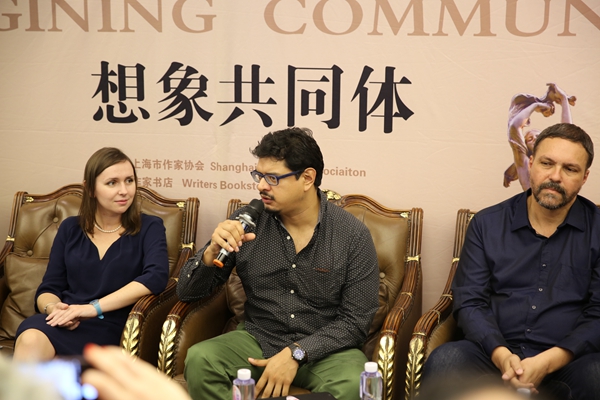The binding power of prose and poems
By Alywin Chew | China Daily | Updated: 2019-09-27 09:03

Eleven literary artists from around the world have descended upon Shanghai to take part in the 11th edition of the residency program by the Shanghai Writers' Association.
Established in 2008, the association's two-month residency program has hosted 89 writers from 36 countries to date. During their stay in Shanghai, these foreign writers get to explore the city on their own, attend cultural tours organized by the association, as well as participate in sharing sessions.
According to the association, the exchange program provides a global platform for writers to share insights into each other's cultures as well as facilitate the dissemination of Shanghai's literature and promote the city's international image.
The topic of this year's sharing sessions revolves around the theme "Imagining Community".
"In today's complicated world, the imagination of communities has faced difficulties brought about by factors including international politics, cultural identity, national consciousness, identity anxiety and accelerating daily life. As a way of observing and narrating the world, writers of literature have shown a long-lasting and sustained enthusiasm and creativity for identity communities, emotional communities and national communities," says the association in a statement.
"The difficulty lies in that, when the imagined communities are accomplished, the conversations between different communities become barriered ... When we talk about communities today, do we aim for mutual understanding or do we just seek room for expression? Is real understanding possible?"
The first session, which was held in the Writer's Bookstore in downtown Shanghai on Sept 6, featured Thai, Rewat Panpipat, and Jamaican, Millicent Graham, who shared a poem and essay related to the topic, respectively.
Graham, a poet from Kingston who also holds a day job as an IT professional, says that she was astounded by the sights of the city while traveling from the airport to her residence.
"The city is just stunning. I am not accustomed to a cityscape with so many tall buildings and a vast network of roads. In my country, they are doing a lot of construction of roads and I can see how inspiring it can be to come here and see how things are created here," she says.
"Everything seems to be well thought out. Pedestrians, cyclists, drivers and scooter riders-everybody has their place on the roads. Even when they traverse each other's spaces, it's not in an uncomfortable manner. That was very intriguing and surprising."
Interested in finding out more about the different cultures in Asia, Graham says that she jumped at the opportunity to stay in Shanghai. Getting accepted into the program also triggered a curiosity about her lineage.
"This program has also given me a chance to explore some personal histories of my own-my great grandfather came from China. I don't know a lot about that side of my family, so I'm really interested to find out more about that," she says.
"I'm also very interested in learning more about the late 1800s in China and what some of the circumstances were that triggered migration."
Another literary artist who is part of this year's program is Gerard Woodward, an accomplished British writer and poet whose book I'll Go to Bed at Noon was shortlisted for the prestigious Man-Booker Prize in 2004.
"I thought that this was a great opportunity to spend a few months immersed in China, a country I've never been to before. I've always liked the experience of being in a city I don't know very well and getting to know it from scratch," says Woodward, who is also a professor of fiction at Bath Spa University in England.
"This has been the most extreme experience. I've lived in America and other parts of Europe, but there's always something to latch on to. Here in Shanghai, there's nothing-I have no knowledge of the language or the culture. I find it fascinating just trying to navigate, trying to find things. Right now I'm just spending everyday wandering around, wondering where I can get food!" he laughs.
Speaking about the concept of community and the need to feel part of a group, Woodward notes that a balance needs to be struck between having a local identity and being a global citizen, as opposed to just being in one camp, which could inherently cause problems.
He points out that the current problems Britain faces with Brexit illustrate this.
"It's when the dogma says you have to be one or the other that problems start to surface," adds Graham.
The two artists also shared their thoughts about the program, with both praising the efforts of the Shanghai Writers' Association to reach out to artists around the world.
"It's very generous when a country decides to bring writers from around the world together just to explore a particular thought, and to have this bestowed on you is rather overwhelming," says Graham.
"To bring people together to have conversations is what makes you more open and tolerant. This exchange also helps you to learn and grow. In this sense, I think the association's contributions to literature is tremendous and generous."
- Hohhot gets taste of folk talent from around the globe
- Former Thai deputy PM: China has undergone 'economic evolution'
- Former Thai deputy PM: China and Thailand will always be a family
- Chinese calligraphy, painting exhibition in Moscow attracts crowds
- Confucius Institute bridges global language barrier
























